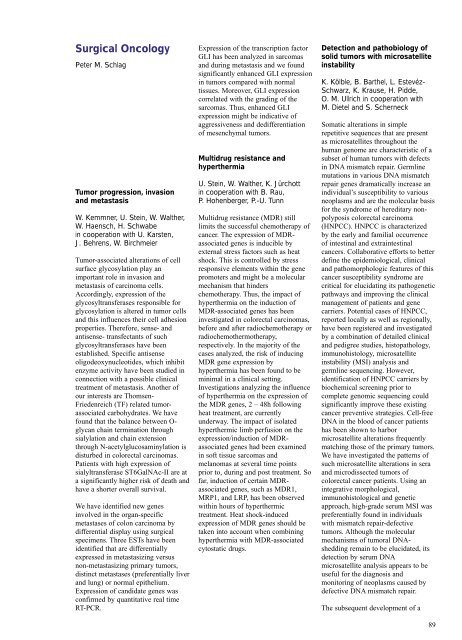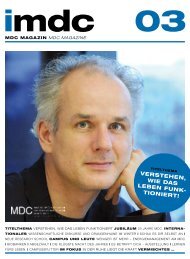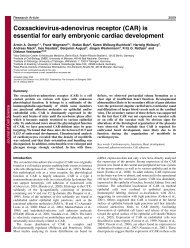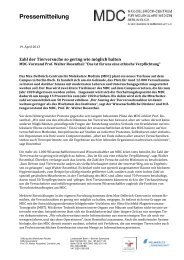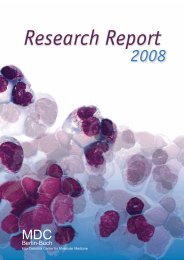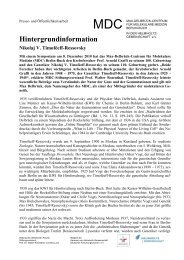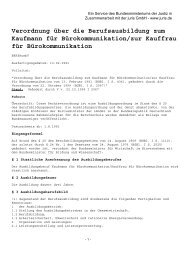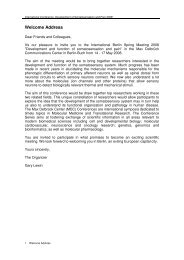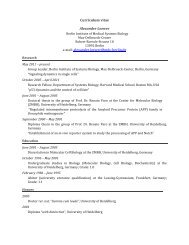You also want an ePaper? Increase the reach of your titles
YUMPU automatically turns print PDFs into web optimized ePapers that Google loves.
Surgical Oncology<br />
Peter M. Schlag<br />
Tumor progression, invasion<br />
and metastasis<br />
W. Kemmner, U. Stein, W. Walther,<br />
W. Haensch, H. Schwabe<br />
in cooperation with U. Karsten,<br />
J. Behrens, W. Birchmeier<br />
Tumor-associated alterations of cell<br />
surface glycosylation play an<br />
important role in invasion and<br />
metastasis of carcinoma cells.<br />
Accordingly, expression of the<br />
glycosyltransferases responsible for<br />
glycosylation is altered in tumor cells<br />
and this influences their cell adhesion<br />
properties. Therefore, sense- and<br />
antisense- transfectants of such<br />
glycosyltransferases have been<br />
established. Specific antisense<br />
oligodeoxynucleotides, which inhibit<br />
enzyme activity have been studied in<br />
connection with a possible clinical<br />
treatment of metastasis. Another of<br />
our interests are Thomsen-<br />
Friedenreich (TF) related tumorassociated<br />
carbohydrates. We have<br />
found that the balance between Oglycan<br />
chain termination through<br />
sialylation and chain extension<br />
through N-acetylglucosaminylation is<br />
disturbed in colorectal carcinomas.<br />
Patients with high expression of<br />
sialyltransferase ST6GalNAc-II are at<br />
a significantly higher risk of death and<br />
have a shorter overall survival.<br />
We have identified new genes<br />
involved in the organ-specific<br />
metastases of colon carcinoma by<br />
differential display using surgical<br />
specimens. Three ESTs have been<br />
identified that are differentially<br />
expressed in metastasizing versus<br />
non-metastasizing primary tumors,<br />
distinct metastases (preferentially liver<br />
and lung) or normal epithelium.<br />
Expression of candidate genes was<br />
confirmed by quantitative real time<br />
RT-PCR.<br />
Expression of the transcription factor<br />
GLI has been analyzed in sarcomas<br />
and during metastasis and we found<br />
significantly enhanced GLI expression<br />
in tumors compared with normal<br />
tissues. Moreover, GLI expression<br />
correlated with the grading of the<br />
sarcomas. Thus, enhanced GLI<br />
expression might be indicative of<br />
aggressiveness and dedifferentiation<br />
of mesenchymal tumors.<br />
Multidrug resistance and<br />
hyperthermia<br />
U. Stein, W. Walther, K. Jürchott<br />
in cooperation with B. Rau,<br />
P. Hohenberger, P.-U. Tunn<br />
Multidrug resistance (MDR) still<br />
limits the successful chemotherapy of<br />
cancer. The expression of MDRassociated<br />
genes is inducible by<br />
external stress factors such as heat<br />
shock. This is controlled by stress<br />
responsive elements within the gene<br />
promoters and might be a molecular<br />
mechanism that hinders<br />
chemotherapy. Thus, the impact of<br />
hyperthermia on the induction of<br />
MDR-associated genes has been<br />
investigated in colorectal carcinomas,<br />
before and after radiochemotherapy or<br />
radiochemothermotherapy,<br />
respectively. In the majority of the<br />
cases analyzed, the risk of inducing<br />
MDR gene expression by<br />
hyperthermia has been found to be<br />
minimal in a clinical setting.<br />
Investigations analyzing the influence<br />
of hyperthermia on the expression of<br />
the MDR genes, 2 – 48h following<br />
heat treatment, are currently<br />
underway. The impact of isolated<br />
hyperthermic limb perfusion on the<br />
expression/induction of MDRassociated<br />
genes had been examined<br />
in soft tissue sarcomas and<br />
melanomas at several time points<br />
prior to, during and post treatment. So<br />
far, induction of certain MDRassociated<br />
genes, such as MDR1,<br />
MRP1, and LRP, has been observed<br />
within hours of hyperthermic<br />
treatment. Heat shock-induced<br />
expression of MDR genes should be<br />
taken into account when combining<br />
hyperthermia with MDR-associated<br />
cytostatic drugs.<br />
Detection and pathobiology of<br />
solid tumors with microsatellite<br />
instability<br />
K. Kölble, B. Barthel, L. Estevéz-<br />
Schwarz, K. Krause, H. Pidde,<br />
O. M. Ullrich in cooperation with<br />
M. Dietel and S. Scherneck<br />
Somatic alterations in simple<br />
repetitive sequences that are present<br />
as microsatellites throughout the<br />
human genome are characteristic of a<br />
subset of human tumors with defects<br />
in DNA mismatch repair. Germline<br />
mutations in various DNA mismatch<br />
repair genes dramatically increase an<br />
individual’s susceptibility to various<br />
neoplasms and are the molecular basis<br />
for the syndrome of hereditary nonpolyposis<br />
colorectal carcinoma<br />
(HNPCC). HNPCC is characterized<br />
by the early and familial occurrence<br />
of intestinal and extraintestinal<br />
cancers. Collaborative efforts to better<br />
define the epidemiological, clinical<br />
and pathomorphologic features of this<br />
cancer susceptibility syndrome are<br />
critical for elucidating its pathogenetic<br />
pathways and improving the clinical<br />
management of patients and gene<br />
carriers. Potential cases of HNPCC,<br />
reported locally as well as regionally,<br />
have been registered and investigated<br />
by a combination of detailed clinical<br />
and pedigree studies, histopathology,<br />
immunohistology, microsatellite<br />
instability (MSI) analysis and<br />
germline sequencing. However,<br />
identification of HNPCC carriers by<br />
biochemical screening prior to<br />
complete genomic sequencing could<br />
significantly improve these existing<br />
cancer preventive strategies. Cell-free<br />
DNA in the blood of cancer patients<br />
has been shown to harbor<br />
microsatellite alterations frequently<br />
matching those of the primary tumors.<br />
We have investigated the patterns of<br />
such microsatellite alterations in sera<br />
and microdissected tumors of<br />
colorectal cancer patients. Using an<br />
integrative morphological,<br />
immunohistological and genetic<br />
approach, high-grade serum MSI was<br />
preferentially found in individuals<br />
with mismatch repair-defective<br />
tumors. Although the molecular<br />
mechanisms of tumoral DNAshedding<br />
remain to be elucidated, its<br />
detection by serum DNA<br />
microsatellite analysis appears to be<br />
useful for the diagnosis and<br />
monitoring of neoplasms caused by<br />
defective DNA mismatch repair.<br />
The subsequent development of a<br />
89


